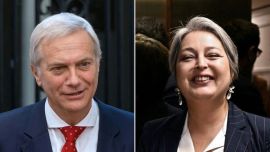Economy minister Martín Guzmán dramatically quit the government on Saturday evening, publishing a copy of his lengthy resignation letter to President Alberto Fernández on social networks.
The announcement came as Vice-President Cristina Fernández de Kirchner – who has been critical of the government's economic direction – was giving a speech in Ensenada, Buenos Aires Province, to mark the anniversary of the death of Juan Domingo Perón.
The minister's decision to step down is another huge blow to the authority of President Fernández, who has seen a number of key Cabinet allies leave his government amid rising tensions in the ruling Frente de Todos coalition.
Guzmán, who led debt renegotiations with the International Monetary Fund, did not say why he resigned in his statement but he called on President Fernández to mend internal divisions so that "the next minister does not suffer" the same difficulties he did.
"It will be essential that you work on an agreement within the ruling coalition," he added in the statement shared on Twitter.
His resignation comes two weeks after Fernández de Kirchner, the two-term former president who has been a constant critic of the government, gave a speech attacking Fernández's economic management.
The news is a blow for President Fernández, who just last month lost another key Cabinet official, Productive Development Matías Kulfas, who had also been strongly criticised by his vice-president.
'Check mate'
Political analyst Carlos Fara told the AFP news agency that Guzmán's resignation was "a check mate for the president's autonomy" and had given Fernández de Kirchner the upper hand in their power struggle.
"The resignation will have a very bad effect in the markets. Even if the president and vice-president reach a consensus on managing the economy, from now on everything will be conditioned by Cristina [Fernández de] Kirchner's pressure."
Fernández de Kirchner did not mention Guzmán specifically in her latest speech on Saturday, though she once again criticised the government's economic direction and said she would do everything in her power to ensure a Peronist victory occurs in next year's presidential election.
As economy minister, 39-year-old Guzmán was tasked with renegotiating a US$44.5-billion debt with the IMF that Argentina insisted it could not afford to repay.
The original debt of US$57 billion – the last tranche of which Fernández declined after succeeding his liberal predecessor Mauricio Macri, who had solicited the loan – was the largest ever issued by the IMF.
Despite strong resistance from Fernández de Kirchner and her wing of the ruling coalition, Guzmán managed to agree a deal and save Argentina from defaulting.
But Guzmán often faced hostility from sectors of the ruling coalition. Criticism has escalated since Frente de Todos lost control of the Senate during last year's midterm legislative elections.
The IMF deal was only ratified by Congress thanks to support from the centre-right opposition Juntos por el Cambio coalition, after a group of lawmakers led by the vice-president's son, Máximo Kirchner, boycotted the vote.
'Growth crisis'
In a notable passage from his resignation letter, Guzmán said whoever replaces him will need "centralised management of the necessary macroeconomic political instruments to consolidate the progress made and face the challenges ahead."
While agricultural powerhouse Argentina has the third-largest economy in Latin America, it has been in economic crisis for years, with inflation of more than 60 percent in the last 12 months.
The country was already struggling with rising poverty, unemployment and a depreciating currency before the coronavirus pandemic exacerbated matters even further.
In his statement, Guzmán "profoundly" thanked President Fernández for his support over the previous "30 months of work, which were marked by an absolutely unique scenario." He cited the negative economic effects of the pandemic and the Russia-Ukraine war in particular.
Earlier this week, Fernández admitted the country was facing "a growth crisis" due to a shortage of foreign exchange.
The IMF deal included provisions to contain inflation and reduce the budget deficit from three percent in 2021 to parity by 2025.
Guzmán's detractors within the ruling coalition hit out at him over perceived excessive zeal in tackling the budget deficit and his monetary policy. He complained several times that these criticisms sent worrying signs to already jittery markets, making his job ever harder.
In a recent report, the Eurasia Group political risk consultancy said the internal divisions would not be resolved any time soon.
"Infighting within the administration will continue to worsen, further hurting the administration's ability to develop a coherent policy plan," said Eurasia.
Although he did not reveal what his next step would be, Guzmán said he would "continue working and striving for a fairer, freer and sovereign homeland."
Fernández has yet to comment on the resignation of Guzmán, who is one of his closest allies.
Speculation concerning Guzmán's replacement was already underway on Saturday evening, with five names dominating the rumour mill: Congress Speaker Sergio Massa (one of the ruling coalition's three key leaders), veteran economist Carlos Melconian and International Economic Relations Secretary Cecilia Todesca.
Other names said to be in the frame include ex-Central Bank chief Martín Redrado and economist Emmanuel Álvarez Agis, with speculation growing that the latter will be approached to take the role.
– TIMES/AFP/PERFIL





















Comments